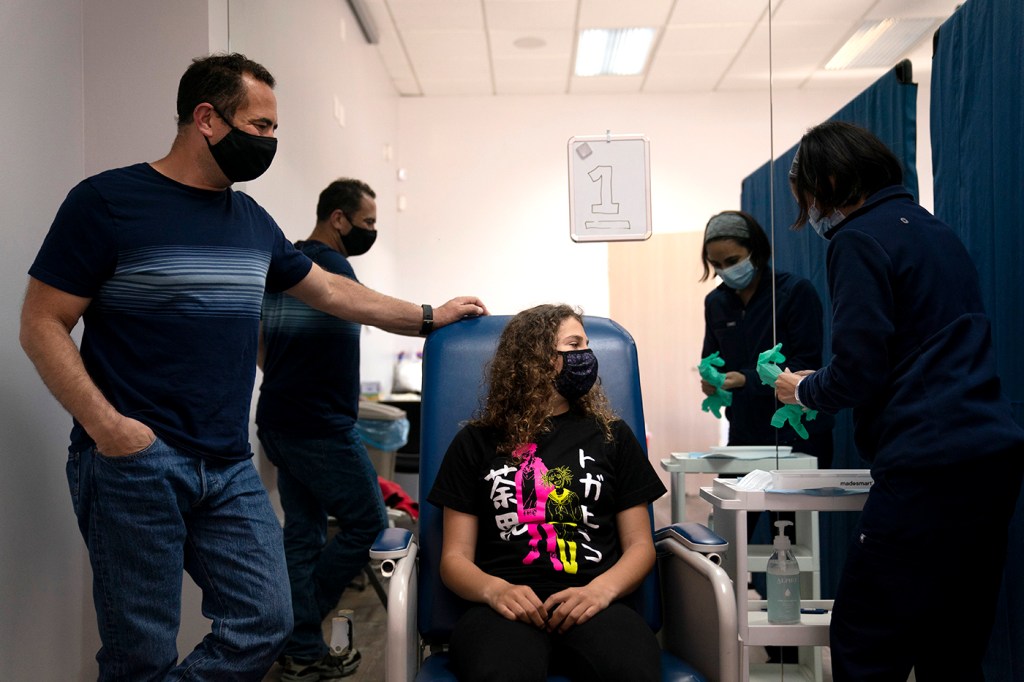Parents remain divided over COVID-19 vaccinations for their kids

While parents have a more favorable view of COVID-19 vaccinations for their children than they did earlier in the year, sharp differences between mothers and fathers have hardly budged, with moms remaining more skittish about vaccines, according to a U.S. survey by researchers from Northeastern, Harvard, Northwestern, and Rutgers.
Lingering maternal reluctance is noteworthy since moms tend to have more influence over children’s health decisions than dads, and their cautious approach could be caused by societal expectations, says Matthew Simonson, a doctoral candidate in network science at Northeastern and lead author of the study.
“Women may be more likely to be judged by society as to how good a parent they are than fathers, and that just creates even more pressure on mothers to play it safe,” he explains. “There’s a false perception that playing it safe means avoiding vaccinations. But this perception may shift as more children start getting sick with the Delta variant.”

David Lazer, university distinguished professor, holds joint appointments in the College of Social Sciences and Humanities and the Khoury College of Computer Sciences. Photo by Adam Glanzman/Northeastern University
The survey found mothers 36 years of age and older were more open toward vaccinating their kids than they were in the spring, with resistance dropping by four percentage points to 20 percent. Fathers in the same age group, however, were far more likely to embrace inoculations, with resistance dropping to 11 percent.
Mothers 18 to 35 years old, however, remain solidly opposed, with only the slightest movement in favor of vaccines. Resistance dropped only one percentage point to 32 percent. But researchers predict more of these mothers will be increasingly receptive once federal health authorities green light vaccines in their children’s age ranges.
“Younger mothers tend to have younger children,” says David Lazer, university distinguished professor of political science and computer sciences at Northeastern and one of the researchers who conducted the study. “So we would expect to see substantial movements [toward vaccines] of younger mothers once we see approval for younger children.”
Adds Simonson: “Availability will increase interest in getting vaccinated. It is a matter of gradually lowering the age for the vaccine.”
Food and Drug Administration authorization could also trigger a trickle down effect in which parents of older children convince mothers of younger kids that it’s alright to get their children their shots, says Simonson. “Then again, there are probably groups of young mothers who find themselves in echo chambers of other young mothers, which reinforces their resistance,” he adds.
Parental attitudes have largely shifted in favor of vaccines since the initial survey began in February and resumed again in April and June, coinciding with federal health authorities’ approval of shots for youngsters 12 years and older.
“Most of the movement we’re seeing is for parents of 13-to-17-year-olds,” says Lazer.
The summer survey of 7,000 U.S. residents ran for a month from early June to early July, weeks after the FDA gave its blessing in May to the Pfizer/BioNTech shots for children 12 years and older. Moderna’s request in June for emergency use authorization of its vaccine in teens ages 12 to 17 is pending before the FDA.
The pharmaceutical companies are conducting clinical trials for children as young as 6 months; approval is expected in the fall, coinciding with the opening of schools in some states.
Getting more mothers on board may energize the U.S. vaccination rate, currently at 48 percent of the total population for fully vaccinated people, according to federal data. That figure rises to 56.5 percent of the population 12 years of age and older.
With school reopenings just weeks away in certain parts of the country, the study found parental support for school vaccine mandates grew significantly from 54.4 percent in the winter to 61.3 percent in the summer. It was driven largely by vaccination approvals for older children.
“Younger fathers moved a bit in the pro-mandate direction, but the other young groups of fathers and mothers didn’t budge at all,” says Lazer.
The survey didn’t differentiate between public or private schools.
It found that Black parents have become far less resistant since the winter, dropping by a quarter (24 percent to 19 percent) while white parents were slightly less resistant (20 percent to 18 percent). Overall, white, Black, and Hispanic parents have similar levels of vaccine resistance. But among parents with similar politics, Black parents tend to be far more resistant than other parents, according to the survey.
Black Democrats, for example, are substantially more reluctant to vaccinate their children than Hispanic, Asian, and white Democrats.
Researchers noted that because Black people have faced a long history of mistreatment by the government, including in the healthcare system, the study took into account levels of trust in government and healthcare institutions in respondents’ answers.
“We discovered that the differences between Black parents and parents of other races shrink substantially once institutional trust is taken into account,” researchers wrote. So higher vaccination resistance among Black Democrats compared to white, Asian American, and Hispanic Democrats “is largely driven by a higher mistrust of government and healthcare institutions.”
While Democrats are united around mandates by more than four to one in favor, a majority of Republicans oppose them, a wider partisan chasm than in the winter. But Republicans may ease off their opposition if younger kids become eligible for inoculations or there is a shift from emergency use authorization to outright FDA approval, Lazer predicts.
“It wouldn’t shock me if we then see a majority of Republicans approving of mandates,” he says.
For media inquiries, please contact media@northeastern.edu.





